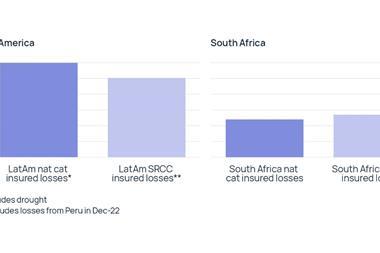What is being done now is operational problem solving. It is no longer risk management, and no longer your job, says Hans Læssøe
Covid-19 is spreading all over the world and each country and company is finding their own way to deal optimally with this pandemic. Some countries will suffer hard, other more lightly – all will be affected.
At the time of writing (25 March) the virus seems to keep spreading in Europe with only small signs of having peaked or potentially peaking within the next few weeks. It appears the US is just at the very beginning of its epidemic, as do countries in Africa.
From a human standpoint, I worry about the severe illnesses and lives lost in countries where the political and healthcare systems are inadequate to handle what the countries are facing. Italy and Spain are in this situation right now. Other countries may follow. A full Italy/Spain replica in the US stands out as almost incomprehensible in size and impact.
From a political/security standpoint, as a “professionally paranoid” risk manager, I wonder/worry which political implications the pandemic may lead to:
- Will any countries go bankrupt, and how will the world community address that?
- Will the world economy be able to “pick up the tab”?
- Will this pandemic hamper EU or US economy and political strength to a degree, where the political balance changes?
- Will this pandemic lead to a widespread focus on nationalistic and populistic policies all over the world, and hence severely hamper the globalisation we have seen over these past years?
- Will increased nationalism and populism lead to conflicts and even wars?
Many risk managers are busy dealing with contingency plans on a very immediate basis … but dear risk management colleagues, what is being done now is operational problem solving. It is no longer risk management, and no longer your job.
As risk manager, you have to focus on the aftermath of the pandemic.
Let me, for the sake of simplicity, assume the pandemic is over by the end of July 2020. I recognise it may be a bit sooner, but also that it may be significantly later. The timing is not the key issue of this article.
What you as risk manager, have to address is the tail of consequences the pandemic has left in its wake – and how your business/company/organisation optimally addresses that. It is well worthwhile, today if you have not already, to skype with a team of your business colleagues and discuss - by the end of 2020, and looking into the years ahead:
1. What will be the state of macroeconomics?
Has there been a decline in global/regional/national Gross Domestic Product (GDP). How big is this, and how does that affect the market your company is catering to … be aware, it may be a positive impact. Naturally, you only have to look at countries/regions in which your company operates
What is expected global/regional/national GDP growth and what does that mean to your business?
No doubt, millions of people have been unemployed for quite some time. How does that affect housing prices, general activity levels, inflation, interest rates, ….?
With massive personal bankruptcies, what is the state of the financial industry and your access to liquidity? Has any of the SIFI’s (Systemic important Financial Institutions) gone bankrupt?
2. What will be your competitive situation?
Will some of your key competitors have grown stronger, or will some be bankrupt?
Will alternative/disruptive business systems have gained a windfall?
What is your competitive position to grow and prosper – where and how?
3. What will be your supply situation?
Will you be able to scale up to meet demand, and if not, what needs to be done to do so? This includes your full value chain, i.e. your suppliers, your supplier’s suppliers as well as your own manufacturing, logistic and selling system.
Are there changes in your costing structure or pricing capabilities?
How and by when will you “recover” to a new and optimised normal, which investments and changes need to be made to get there?
4. What is your employment situation?
Do you have or will you be able to hire the staff you need?
Is there a need for a different skill-set and hence a change of employee profiles and mix?
5. What is your strategic situation?
Is your current strategic agenda – you know, the one you made last year and designed to take you well into the 2020’s – still be relevant, or will it need a serious “makeover?
How does a change of strategy change your resource allocation and company priorities?
Do you have access to funding of activities to the extent needed, when needed?
Now, all of these questions are not equally relevant to all companies, and the first agenda item is hence to prioritize, what most significantly affects your company’s performance going forward, and hence, what to address now and what to look at later.
Strategic risk management
All of the above considerations are normal strategic considerations applied, when the company works with their strategic plan. In that, and in a “normal” world, this progresses at a certain pace, once we have grown accustomed to.
Traditional strategic planning is hence a process where tomorrow is not very different than today, and we can adjust as we need to, if/when conditions change. That said, some companies have found themselves disrupted by competitors changing the rules of the game. Cases in point would be digital photography for the photo industry, iTunes for the music industry, Uber for the taxi industry, Airbnb for hotels, smartphones … the list is endless.
The COVID-19 pandemic in that context, is a disruption for largely everyone and as such, it is like moving towards a T-junction.
“The road ahead will NOT be like the road you just came from, and you have to make a series of choices NOW to decide where to go, when you meet this junction.”
The process of strategic risk management is the deliberate process of describing and discussing various plausible scenarios and based on these, define what is expected to be the optimal way forward.
The conditions of the years ahead are so uncertain that making one strategic plan based on one set of assumptions is almost leadership recklessness. Management needs to prepare for alternative truths and futures as never before.
Risk manager – step up
Dear risk management colleague. You are the company expert on dealing with uncertainty. Step up and leverage that skill/competence for the good of the company and ensure your organisations. Discuss and address:
- What are the most important changes we are facing in the aftermath of this pandemic?
- What are options to address these?
- What do we decide to do? Now? Later if/when? …
- What is our projected/expected performance range? Best case/ Expected/ Worst casee. And are we happy with that?
Once you have that, you can start addressing the Business Continuity Plan you had for pandemics and address what changes will be needed for this to be effective for the next pandemic, which statistics say will happen within a three to five year period. Only the next one will:
- Be more or less infectious and hence spread faster or slower than Covid-19. Do bear in mind, that three to five years from now, the world may be even more globalised than it is today;
- Be more or less lethal than Covid-19, and
- Potentially mutate as it spreads, making handling and curing even more complicated.
This is not the time to worry – this is the time to step up to your title and earn your keep.




















No comments yet